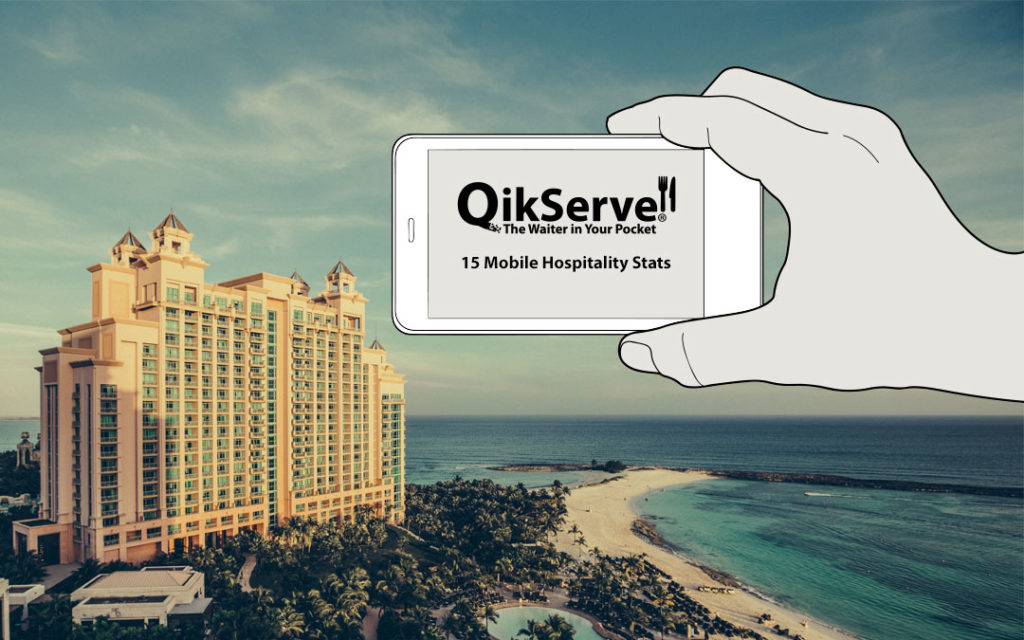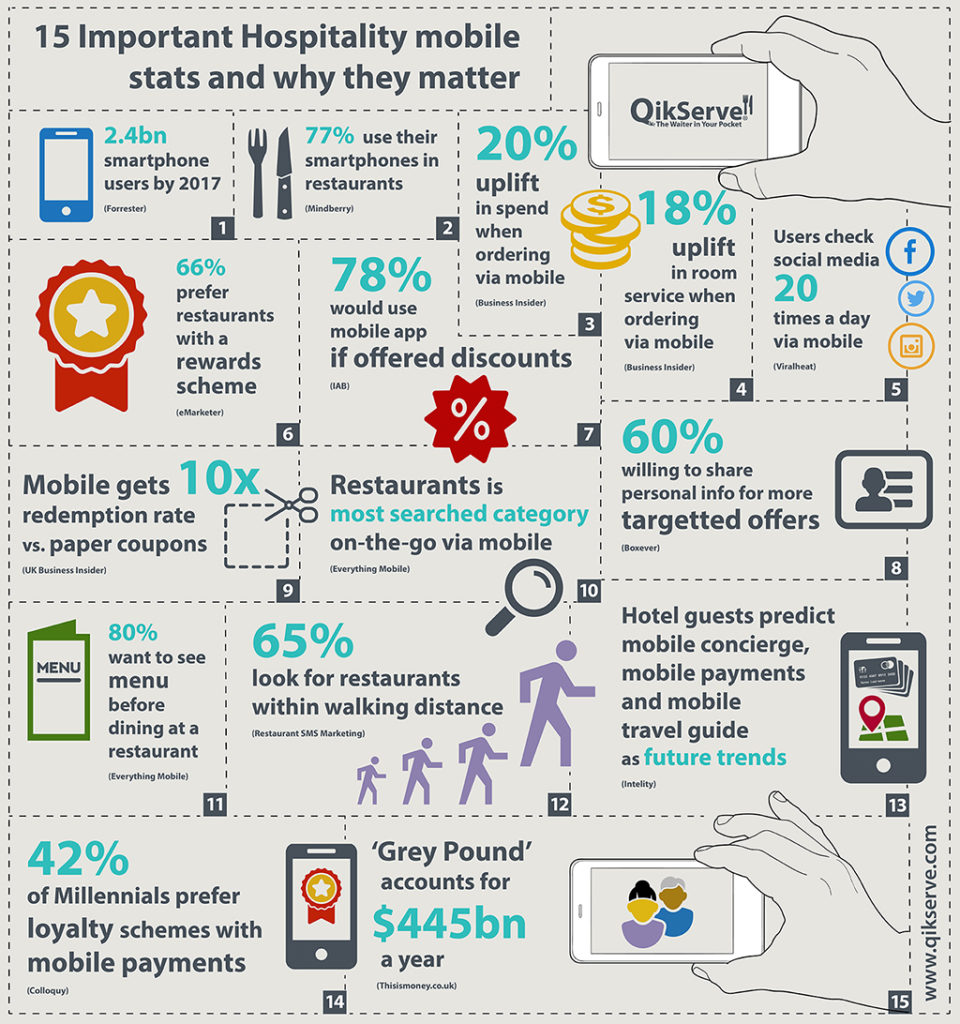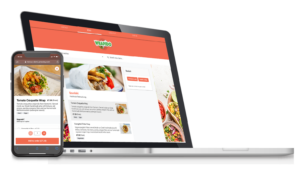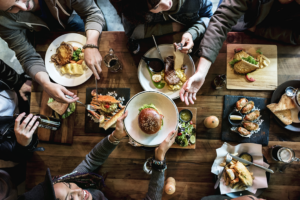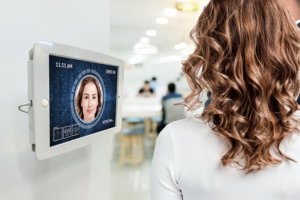1.There will be 2.4Bn smartphone users by 2017 (Forrester)
That means there will be greater access to mobile phones than toilets and more people will have phones than electricity!
Why this matters:
Prolific, global smartphone adoption matters because if you’re a restaurant, hotel, casino or stadium and you don’t have a mobile strategy, it’s time you got one! Whether operators are ready for it or not, smartphone penetration will only grow along with consumer expectation for mobile self-service. Customers now expect to be able to browse, order and pay for goods and services and access information, regardless of industry, with a click of their finger. Whether it’s banking, retail, travel or hospitality, your guests have adopted an intuitive digital mindset that is only going to grow over time.
2. 77% of people use their mobile phones in restaurants (Mindberry)
Why this matters:
Your guests are already using their phones in restaurants, wouldn’t it be better that instead of using it to buy cinema tickets or browsing Facebook that they are instead using it to look through your menu, share photos of your food or buy products from your resort’s stores? The point is, regardless of where they are, people will be engrossed in their phones or at the very least have them in their pocket or sitting out on the table. Why not make the most of it and guide their usage to benefit your brand?
3. Guests typically spend 20% more when ordering via mobile than with wait staff (Business Insider)
Why this matters:
Often the increase in spend can be even greater as shown by recent study of thousands of our customer transactions which found an uplift of spend per head of between 50-73%! An increase of even 20% per order is a significant revenues leap in the right direction and can signal the potential for huge profits for restaurants, casinos and hotels if they get mobile food order and pay right.
4. There’s an 18% increase in room service orders when made via mobile (hotelexecutive.com)
Why this matters:
Room service revenues have been in solid decline in recent years with may operators changing the nature of room service by implementing a deli-style format or simply getting rid of the service altogether. However, if Diamond rated hotels want to keep their AAA rating, room service needs to be available for breakfast, lunch and dinner. But it doesn’t need to be a terminal case. Instead of depriving guests of this once beloved service, why not give it a 21st Century facelift and make it profitable once again? You have a large, affluent demographic hungry for mobile interaction, expecting lightning fast service and convenience meaning a digital dining experience is ripe for the picking.
5. Users check social media on their smartphone on average 20 times a day (Viralheat)
Why this matters:
Consumers not only expect to pay for things with their mobile but, in their increasingly connected social world, they want to share information, shout about their news, wow friends and family with filtered photos and engage in witty banter about each significant moment of their day. This means including a social media function in your mobile application not only keeps your guests happy but provides a very valuable channel your guests can use to shout about your brand and share photos of their experience with you. And when 92% of consumers say they trust word-of-mouth recommendations from friends and family when it comes to travel and hospitality, social media has huge potential for brand advocacy. (Hotel Marketing)
6. 66% of diners prefer restaurants that have a rewards scheme (eMarketer)
Why this matters:
A smart reward scheme is a valuable feature of any operator’s mobile app, after all, who doesn’t like being rewarded for their loyalty? Mobile loyalty has the added advantage of being very convenient (no need to remember a plethora of loyalty cards) and smarter than a standard punch card. With an integrated mobile loyalty scheme, you can target your most valuable guests making sure they enjoy the full VIP experience encouraging loyalty to your brand.
7. 78% of diners would be incentivised to use mobile with order discounts and 64% by loyalty points (IAB)
Why this matters:
If you’re about to launch a mobile app for your guests and you’re concerned about how to encourage adoption, mobile discounts and rewarding them with additional loyalty points are great incentives. As with any new technology implementation, operators are under pressure to justify the spend with ROI figures and these figures will only materialise if consumers are using the technology. As well as advertising and wait-staff driven promotion of the services, a more cost-effective way is to use mobile order discounts and rewarding mobile users with additional loyalty points to encourage them to start and continue using the app.
8. 60% of consumers want offers targeted to where they are and what they’re doing and they’re willing to share personal information for rewards (Boxever)
Why this matters:
The mobile order feature of a hospitality app is the key to enabling personalisation. Without it, operators’ marketing and loyalty schemes are flying blind essentially taking a one-size-fits all approach to guests. By automatically capturing guest data when they order, operators can gain valuable insights including a guest’s buying habits, what food they order the most, when they order, what modifications they make, the stores they visit the most etc. By gathering this data, you can use it to power highly targeted and personalised marketing campaigns leading to greater engagement, conversion and ultimately, sales.
9. Mobile coupons get 10 times the redemption rate of traditional coupons (UK Business Insider)
Why this matters:
If you don’t have the ability to capture customer data or your CRM and marketing platforms aren’t integrated into your mobile ordering solution to get that level of personalisation, not to worry. The very fact that you’re delivering discounts by mobile gives you 10 times more chance that your customers will redeem it. Personalisation and targeting should be the goal for mobile marketing but every operator needs to start somewhere and offering coupons by mobile is a great place to do it.
10. Restaurants is the the category most searched for on-the-go and the majority of mobile searches occur in the afternoon and evening (Everything Mobile)
Why this matters:
Afternoon and evening searches are ideal times for any restaurant marketing itself for lunch and dinner. Again, emphasising that personalisation theme, make sure you tailor offers to the time of day and ramp up your marketing activities just before and during peak hours like lunch and dinner.
11. 80% said it is important to see a menu before they dine at a restaurant (Everything Mobile)
Why this matters:
Whether it’s online, via tablet, mobile web or your brand’s smartphone – regardless of channel – make sure you include an easily navigable, image-rich menu with accurate descriptions. Your guests want to see what they’re going to spend money on and the more enticing you can make the menu, the better.
12. Location proximity is a key driver for smartphone users with 65% looking for a restaurant within local walking or driving distance (Restaurant SMS Marketing)
Why this matters:
When 74% of consumers are willing to share location-specific data to receive improved offers and services, ‘find nearest’ is a great feature to include in your mobile app. It allows your guests to locate their nearest venue and even gives them real-time directions on an interactive map to make sure they get there ok. By combining location information with personalised marketing, you can create a very powerful incentive for guests. Imagine you’re on holiday, walking down the street in a new city and receiving an alert: “Hi Peter, welcome to New York! We’re only a 5-minute walk away, come in for 40% off your usual latte and chocolate muffin!”
13. Hotel guests see mobile as the future of the guest experience as they predict 3 main travel innovations by 2030: mobile virtual hotel concierge, mobile payments and personalised mobile travel guide (Intelity)
Why this matters:
This prediction serves to highlight the importance your customers place on mobile and its use as a guest-facing channel within Hospitality. While operators are starting to beef up their mobile strategy, it’s worth taking a longer-term looking into the future, putting the foundations in place now to enable a more powerful solution in the years to come. Whether that includes a move to Cloud, upgrading estate infrastructure for faster Wi-Fi and more robust bandwidth, it’s worth considering and planning for now so you’re prepared for the future.
14. 2% of Millennials participate in loyalty programs because it has a mobile payment option (Colloquy)
Why this matters:
Mobile payment matters to Millennials (a demographic that has $907Bn in spending power according to Visa). When considering your mobile application, it’s important to look at enabling mobile payment and enabling it through a number of payment providers: Visa, MasterCard, PayPal, isoPay – the key is flexibility. It’s also imperative that your mobile payments are safe and secure, giving customers that peace of mind so they continue to use your mobile services.
15. The ‘Grey Pound’ accounts for $445Bn a year (Thisismoney.co.uk)
Why this matters:
Millennials are mentioned a lot when it comes to the target demographic for new technology implementations but it would be remiss not mention the over 50s. They have huge spending power and as over 50% of the US population will be over 50 by 2017, they will control over 70% of the disposable income meaning operators need to give them some tech respect. The over 50s are more technologically savvy than we give them credit for and including them in your marketing efforts could give you that allusive competitive and therefore revenues edge you’ve been looking for.

